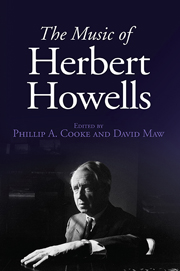Book contents
- Frontmatter
- Dedication
- Contents
- List of Illustrations
- List of Musical Examples
- List of Tables
- List of Contributors
- Foreword
- Acknowledgements
- Miscellaneous Frontmatter
- Introduction: Paradox of an Establishment Composer
- PART I Howells the Stylist
- PART II Howells the Vocal Composer
- PART III Howells the Instrumental Composer
- PART IV Howells the Modern
- 10 ‘Tunes all the way’? Romantic Modernism and the Piano Concertos of Herbert Howells
- 11 ‘I am a “modern” in this, but a Britisher too’: Howells and the Phantasy
- 12 Austerity, Difficulty and Retrospection: The Late Style of Herbert Howells
- PART V Howells in Mourning
- Appendix: Catalogue of the Works of Herbert Howells
- Bibliography
- Index of Works
- General Index
11 - ‘I am a “modern” in this, but a Britisher too’: Howells and the Phantasy
from PART IV - Howells the Modern
Published online by Cambridge University Press: 05 December 2013
- Frontmatter
- Dedication
- Contents
- List of Illustrations
- List of Musical Examples
- List of Tables
- List of Contributors
- Foreword
- Acknowledgements
- Miscellaneous Frontmatter
- Introduction: Paradox of an Establishment Composer
- PART I Howells the Stylist
- PART II Howells the Vocal Composer
- PART III Howells the Instrumental Composer
- PART IV Howells the Modern
- 10 ‘Tunes all the way’? Romantic Modernism and the Piano Concertos of Herbert Howells
- 11 ‘I am a “modern” in this, but a Britisher too’: Howells and the Phantasy
- 12 Austerity, Difficulty and Retrospection: The Late Style of Herbert Howells
- PART V Howells in Mourning
- Appendix: Catalogue of the Works of Herbert Howells
- Bibliography
- Index of Works
- General Index
Summary
British chamber music during the first half of the twentieth century was convulsed with a ‘phantasy mania’. The competition for ‘phantasies’ inaugurated by W. W. Cobbett in 1905 was enthusiastically received and became the first of a series that continued under differing aegises through the next four decades. The genre that it spawned was also taken up outside this context, both through Cobbett's own commissioning and through the independent interest of composers beyond his sphere. In a short period of time, the genre had established itself; yet it did not long survive Cobbett's death in 1937 and had all but entirely vanished in the postwar period.
Cobbett's idea with the competitions was to encourage the writing of short chamber works of modest technical demands. The first competition specified a string quartet in one movement not exceeding twelve minutes in length: ‘The old English Fantasy may be suggested as a typical form which presents possibilities of modern development.’ Cobbett intended the phantasy label to refer to the Tudor-Jacobean consort-and-keyboard genre, the fantasy; the initial ‘ph’ was his own faux-archaising touch. he later confessed that at the time of advertising his first competition, his own knowledge of the ‘old English Fantasy’ was ‘very restricted’; and it is highly unlikely that those taking part in the early competitions were any better informed. The fantasy repertoire was not yet published, and knowledge of the works in early sources was limited to a very small number of experts.
Information
- Type
- Chapter
- Information
- The Music of Herbert Howells , pp. 185 - 221Publisher: Boydell & BrewerPrint publication year: 2013
